- Home
- L. A. Weatherly
Broken Sky Page 12
Broken Sky Read online
Page 12
When I wasn’t fighting, I was practising. I think I was determined to never lose again, though deep down I knew how crazy that was. If I saw Collie, I ignored him. He seemed to ignore me, too, though I thought I felt his gaze on me sometimes.
I never looked to see.
“What’s going on with you and that new pilot?” said Vera one morning. We were in the kitchen getting ready to go to the morning meeting. She didn’t look up as she spooned cat food into Peter’s bowl.
I tensed. “Nothing. Why?”
“No reason.” Then she glanced at me. “Did I tell you I broke up with Marcus a few weeks ago?”
I’d been pouring myself a cup of coffee. I stopped and stared, remembering the two of them slow-dancing to the wailing jazz. “You did?”
“Yes,” she said flatly. She rose and rinsed off the spoon. “It wasn’t fair to him to let it get so serious, not with what we do. Be careful, Amity.”
I didn’t need her to tell me that. Yet passing by the Tier Three practice field one day, I stopped and watched as a blue Firedove sliced through the air. Somehow I knew it was Collie. The pilot went into a shrieking turn, holding it just a hair from stalling; he rolled sideways and got his opponent in a spray of fake bullets.
As I watched I remembered a dog-eared pamphlet I’d seen in the Heat. It had been written in short, punchy text, as if whoever wrote it didn’t have much time. John Gunnison is a madman. His lackeys are violent thugs. Don’t believe what you hear about Gunnison’s policies being good for the Central States. We live in uncertainty and fear. Neighbours turn against neighbours to save themselves…
My scalp had prickled as I read about correction camps: places of misery and murder. Was that what happened to the Discordants?
And Collie had lived in the Central States. How much of all this had he seen…lived through?
Now I stood peering upwards, shading my eyes as I took in Collie’s sharp control. I wasn’t surprised that he was such a good pilot; he’d always flown really well when Dad had taken him up. I wished that Dad could see him now.
Far across the field, the Firedove came in at an angle, its swirling pattern glinting. It touched down with hardly a bump.
Without thinking I started to jog across the grass, suddenly wanting to tell Collie how well he’d flown. I stopped myself as he climbed down from the cockpit. Even from this distance, every move of his lean form was familiar.
The ache that went through me startled me – stiffened my spine. No. Shaken, I turned and left the field. The grass rustled at my feet, whispering things I couldn’t catch.
I half-expected Collie to see me and come running after me, but he didn’t.
The die showed the symbol for sunset.
The controller stood hunched, holding the phone’s chunky black receiver between his ear and shoulder. He scribbled down what I’d rolled, and then checked the schedule for a slot.
“17.25,” he said into the phone. There was a pause. “Holy Hills,” he informed me.
Dusk, then. Over the hills, that meant mist. When the time came, I jogged out to my plane, my parachute bouncing over one shoulder. A few minutes later I was speeding down the airstrip, engine roaring; then my plane lifted away from the ground and pierced the sky.
I headed west, where the Holy Hills crouched darkly against the horizon. Tucked high in their folds were a pair of ancient letters: an “H” and an “L”. Whenever I saw them, I mentally added an “A” for my brother’s name. Once there’d been homes up here, too. You could still see the flattened foundations, and kidney-shaped holes that had been swimming pools.
Now it was just another battlefield.
I entered the airspace over the hills. Mist flying was tricky – too much of it and you had to turn tail and reschedule. Tonight it was just right: pockets of white rose up from dips in the land below like ghostly invitations, with clear sections in between.
At exactly 17.25, I spotted the Alaskan plane. Its blue and tan swirls ducked away into the mist.
“Here we go,” I murmured.
The world fell sideways as I banked, my fingers gentle on the stick. I roared through patches of white, trying to guess where the other Firedove might be hiding.
All at once my opponent appeared right below me. My pulse skipped with adrenalin and surprise. I twisted into a dive and screamed towards them, firing. Eight streaks of tracer bullets turned invisible in the mist, then visible again. Holes rained across the other Dove.
“Usually a good idea to check your mirrors,” I said softly.
I circled above, watching to gauge the damage. I could feel myself frowning: that sort of clumsy mistake didn’t usually happen in Tier Two fights.
Black smoke billowed from the other plane’s hood. The engine skipped a beat, then died. I saw my opponent shove the cockpit open – and I must have gotten their steering system too, because the Dove started to plummet towards the ground. The pilot hastily undid their straps, then stood up and bailed.
“No,” I breathed, my fingers suddenly tight on the stick.
I could see it all unfolding in a kind of terrible slow motion. The pilot half-fell from the cockpit, exactly as we’re trained – and then the Firedove went into a spin. The pilot slammed against the side of the falling plane; their belt got snagged on the cockpit hood. They lay caught flat, struggling as their parachute billowed open above.
“Get it off, get it off!” I shouted.
I was damp with sweat, cold all over. I dived after the other plane, wildly thinking that maybe there was something I could do. There wasn’t. The trapped pilot writhed and kicked against the hood. Their parachute cords got more tangled with every spin. I glimpsed the raw panic on the Alaskan pilot’s face as the ground sped closer and closer. Finally I pulled out of my dive; I had to.
The plane crashed below.
With a dull whump, the gas tank blew: for a long, fierce moment, flames plumed up. Then there was nothing – just the crumpled shape of the plane visible through patches of mist.
I circled once, frantically looking for a spot to land, then brought my Dove down on the grass and rocks. The world bounced violently – my straps bit at my shoulders. The ground loomed as I almost somersaulted, then the Dove righted itself with a heavy jolt.
I grabbed for my mic. “Pilot down!” I gasped. “Over the Holy Hills – send someone fast!”
I yanked off my straps and scrambled from the cockpit. Utter silence. I dropped to the ground and started to run. Faint paths showed through the mist; there was a rocky indentation that might once have been a house.
The other Dove lay ahead. It had hit nose-first, crumpling the hood like tinfoil. Its tail stuck almost straight up, and one of the wings had come off. Smoke drifted upwards, looking oddly peaceful.
I was breathing hard. I jogged to a halt and pushed my goggles up – I stared at the wreckage. No one could have survived that. Then I heard a faint moan and jerked into motion again, sprinting towards the plane.
The Alaskan pilot lay on the ground by the shattered wing. Their body looked small, huddled. One leg was bent at a weird angle.
I dropped to my knees beside them. I couldn’t speak. It was a girl about my own age with dark eyebrows. That was all I could tell. Her features were wet with blood. A mangled-looking injury bloomed at the edge of her leather helmet: blood so dark it was almost black, and shards of white that I realized were bits of her skull.
The world fell sideways. I was crouching in a field of tall grass – there were grasshoppers singing, and my father lay choking on his own blood.
The girl shuddered. I somehow shook away the vision and touched her shoulder. “You’re all right – you’ll be just fine,” I told her. My voice sounded too loud, falsely hearty.
She opened her eyes and saw me, though her goggle lenses were streaked with blood. Her mouth moved. I couldn’t hear her and leaned close.
“Please can you…” The words were a stir of breath against my ear.
Her hand moved feebly. I
snapped off my leather gloves and gently pulled hers off, too. I gripped her hand. “What?” I whispered. “Tell me what you want me to do.” I listened tautly for planes, approaching trucks – anybody.
Her throat moved as she swallowed. “Tell my family…it doesn’t hurt. Please tell them that.”
“I will,” I said feverishly. “I promise.”
She let out a deep sigh. Her fingers grew limp.
“No!” I cried. I squeezed her hand harder. “Hang on! Do you hear me? Someone will be here soon to help!”
I could hardly hear her when she spoke next. “Tell them I’m sorry. It wasn’t supposed to be like this…”
I’m not sure of the exact moment when she died. I kept crouching there, clutching her hand…and gradually became aware that the only sound of breathing I could hear was my own. The girl’s face had gone completely still. Her eyes stared upwards, unseeing.
I felt numb as I let go of her fingers. I slowly reached for her goggles and lifted them upwards. They caught a little in a curl of escaped hair, the brown strands already going stiff with blood. Her eyes were very blue. I could see now how pretty she was.
Heat pulsed through me. “Why didn’t you check your mirrors?” I yelled at her. “You’re a Tier Two pilot! You’re supposed to be better than that!” My voice bounced back at me from the hills. A few rabbits grazing nearby startled and ran, their tails flashing white for danger.
I sank back onto my heels, staring at the girl. Then, remembering my promise, I fumbled to undo her leather jacket. Her body lay still and unresisting. Her ID tags were on top of her shirt – they still felt warm. I lifted them up and peered at them in the faint light.
Concordia Winston, they read.
My throat tightened. “Concordia”, for “peace”. Just like my own name. From nowhere, I remembered my father saying, The fight for peace is in your blood.
I felt empty. I lay the tags back on her chest. “I’ll tell them,” I said softly. I tugged her jacket closed again as if I thought she’d be cold. “Don’t worry.”
I stayed beside her until the trucks finally came.
Chapter Fourteen
The waves rose and fell. The low noise of them, their sheer power, ached through me and made the music drifting out from the party sound thin and false. If you swam far enough out there, I bet the water was cold, even here in Angeles County.
Dark and cold and endless.
I shivered. A guy standing next to me on the deck – Kyle? Lyle? – took it as an invitation and put his arm around me. “Kinda nice out here, isn’t it?” he said. “All the nature and scenery.”
“Yeah,” I murmured, hardly noticing him. Still staring at the ocean, I rubbed my arms and wondered what time it was.
Vera was in the house somewhere. Coming to the party had been her idea. I wasn’t sure why I’d agreed, except that the thought of staying at home alone tonight had filled me with dread, and the poker game had seemed so pointless that I couldn’t even fathom it. I’d thought that maybe music and noise and people would drown out the image of Concordia’s lifeless blue eyes.
They didn’t.
When the trucks had come, I’d been pulled aside from Concordia’s body while they tried to resuscitate her. They figured out it was hopeless soon enough. They’d brought a canvas body bag and they slithered her into it, feet first.
One of the team had given me a distressed look. “Miss Vancour, you shouldn’t have landed. Pilots aren’t supposed to see this.”
My voice had been oddly calm. “If I hadn’t shot her down, she’d still be alive. Why shouldn’t I see it?”
“Hey, you look so serious,” whispered Kyle or Lyle. He put his hands on my shoulders and turned me towards him. His lips were on mine before I realized what was happening. I jerked away.
“What are you doing?” I said in amazement.
“Just being friendly.” He gave me a smile that was probably charming, if you were in the mood. “Why not? I like you, you like me…”
I felt like a taut wire. “But I don’t like you.”
His smile slipped. “You don’t?”
“No! I don’t even know you.” I pressed a hand against my head. It was throbbing suddenly. I didn’t know anyone here. Not a soul – not even Vera, when it came down to it. And nobody here knew me.
The loneliness felt as if it might crush me.
“I’ve got to go,” I said faintly.
“Go? But I thought—”
I left the deck without waiting to hear. Inside the house, I struggled through the crowd as the wild music enveloped me. A cluster of people stood around the piano, laughing, as someone played.
“Amity, what are you doing?” Vera appeared, petite and pretty in a bright yellow dress, just as I found my coat on the sofa.
“I’ve got to leave,” I said.
“But we just got here! I know you must still be upset, but—”
“I’m leaving,” I repeated. I felt as if I might fly into pieces. Across the room, a couple had started jitterbugging, the guy swinging the girl around wildly. The piano player stomped the floor with one foot, keeping time to the boogie-woogie as the crowd cheered.
And that’s when I realized: there was only one person in the world who I wanted to be with right now.
“Why don’t you come, too?” I said urgently to Vera, lifting my voice over the noise. “You could go and see Marcus.”
She froze, clutching her glass as if it were a shield. I blundered on: “He usually works Thursdays, right? If you hurry you could make it before closing time! Vera, he really cares about you.”
I thought the glass might break in her hand. She stared over at the dancers; I saw her swallow. Finally she looked back at me and gave a small smile that didn’t reach her eyes.
“Go, if you’re going,” she said.
The streetcar ride back to base seemed to take hours. I sat tensely, reading the advertisements over and over. When we finally reached base I leaped up before the car came to a stop. I jogged down the steps and then ran through the main gates, thrusting my pass towards the guard.
I kept running. I staggered on one of my high heels; I skipped for a few steps to yank the shoes off, then pounded across the asphalt towards the airstrip office.
I burst in through the double doors, breathing hard. The board was in the main corridor: a chalkboard with all the pilots’ names on it. I’d seen the details of his fight when I’d prepared for my own, though I’d told myself I wasn’t looking.
Reed, C. T3, night fight, central fields. The blue circle showing that a pilot was down and safe wasn’t beside his name. I rushed to the counter. Myra, one of the pursers, glanced up in surprise.
“Is Collis Reed back yet?” I gripped the counter’s edge tightly.
She was addressing envelopes; she shook her head as she licked a flap. “No, he was shot down.” She put the envelope aside and picked up another.
My mouth went numb – I snatched the envelope out of her hand. “What are you telling me? Is he dead? Is that it?”
Myra looked alarmed. “No! Oh, Miss Vancour, I’m sorry – I just meant that he lost his fight! He had to bail from his plane; they’re bringing him back in now.”
I was already running again. I bolted out the door to the airstrip – and from a distance, I could see headlights approaching down the road that ran adjacent to it. I jogged to a stop, still clutching my shoes. Tall electric lights blazed overhead. Someone’s plane touched down; the fitters ran past me.
The headlights grew closer. A truck came into view. As it veered towards the office I could see that Ruby, the T3 team leader, was driving. Collie sat beside her, slumped in the seat. When he saw me he sat up slowly, frowning.
I’d begun to shiver, though earlier my coat had seemed too warm. I started towards the truck, dimly realizing that my stockings were torn beyond redemption. Ruby pulled up, engine still idling. Collie climbed out and she drove off across the airstrip.
Collie’s gaze locked with mine as
he came towards me: a tall, lean pilot wearing a leather flight jacket that already looked battered. His goggles hung around his neck; his ruffled hair was dark gold under the artificial lights.
I stopped a few feet away. So did he. Another Dove touched down, its engine roaring in the background.
“Amity,” said Collie finally. He had a smudge of oil across one cheek.
I cleared my throat. “I…wanted to see you.”
“I was just going to come and find you.” His expression was serious, unsmiling. “I heard about your fight. Are you all right?”
“I’m fine. Fine.”
His eyes said that he knew better. He closed the distance between us. “Come on,” he said quietly.
With one hand lightly on my back he steered me towards the small, bright cafe near the office – it was for pilots, open all hours. Its lights spilled out onto the dark asphalt. When we got inside we were the only ones there. The empty round tables stood slightly askew, like drunks at a party.
Collie settled us at a table and ordered coffee. When it arrived he pushed the sugar container towards me without asking.
“You’re supposed to sign in,” I said.
“Myra can wait a little longer.” He poured cream in his coffee and then handed me that, too. I stirred it in slowly, listening to my spoon hit the sides of the worn white mug, very aware of Collie sitting across from me – the familiar face grown older, the new broadness of his shoulders.
Collie took a gulp of coffee, then leaned forward on his arms. “Tell me,” he said simply.
I hadn’t known I wanted to talk about it – this wasn’t what I’d planned to say to Collie when I’d come running to find him. But once the words started I couldn’t stop them, despite the tightness of my throat. I told him everything. It felt as if it was being dredged out of me in harsh, ugly lumps.
“Her name was Concordia,” I finished finally. I rapped my spoon against the table, staring down at my inverted reflection – seeing again the girl lying shuddering in the ancient garden. “So I guess…maybe she came from a Peacefighting family like mine. She might have heard the same stories I did, growing up.”

 Watcher
Watcher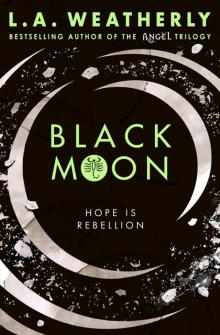 Black Moon
Black Moon Angel
Angel Angel Fire
Angel Fire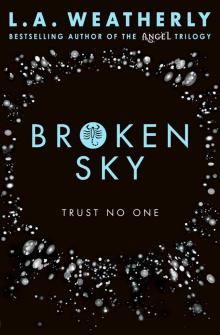 Broken Sky
Broken Sky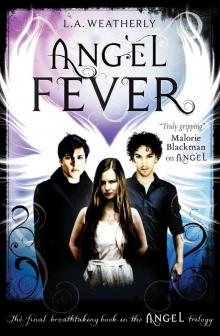 Angel Fever
Angel Fever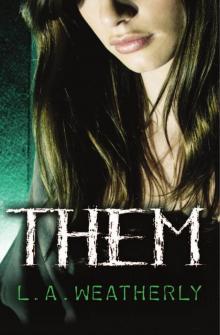 Them
Them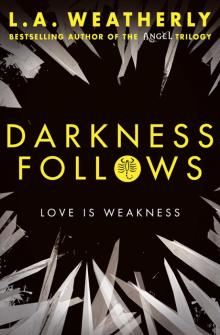 Darkness Follows
Darkness Follows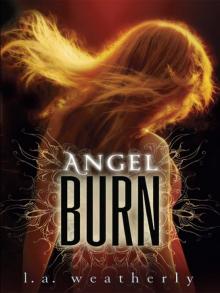 Angel 2 - Burn
Angel 2 - Burn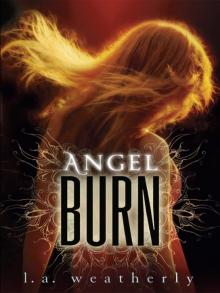 Angel Burn
Angel Burn